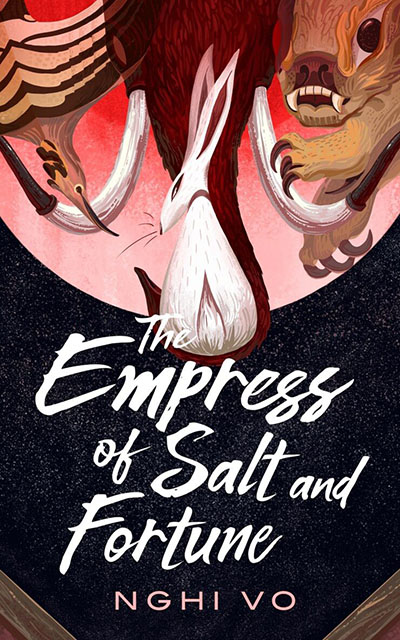You will never remember the great if you do not remember the small.
Nghi Vo’s Hugo-nominated debut novella is set in a fantasy-version of Imperial China, and tells the story of an exiled Empress and her loyal, rabbit-toothed servant girl. Both of them were too lowly to be kept around the palace, but too important to be allowed to go home, and between them they conquered the Empire.
The author tosses the reader into the middle of the setting without a lot of explanation, so it took a few pages for me to find my footing. It’s a similar situation to Chih – a cleric from the Singing Hills Abbey – who’s traveling through an unfamiliar region where “getting eaten alive by ghosts” is a pretty common outcome for travelers. Chih is on the way to the Dragon Court to see the newly-crowned Empress, but the site where the previous Empress spent six years in exile has been recently “declassified”, and Chih can’t resist being the first explore the place that’s been locked to outsiders for decades.
Chih and their companion – a talking Hoopoe bird named Almost Brilliant – are a little surprised when they reach Thriving Fortune on the banks of Lake Scarlet and find that someone else has gotten there first. An old woman who asks to be called “Rabbit” is making one last visit to the place where she served Empress-in-exile In-yo, and she has an impressive amount of information to share about her time there.
Cup. Polished mahogany inlaid with silver. A silver spider is inlaid into the bottom of the cup.
Five cubed dice. Bone and gold. The figures inscribed in silver on each side include the moon, a woman, a fish, a cat, a ship, and a needle.
Chih’s duty is to listen and observe, and The Singing Hills clerics are instructed to record every detail, no matter how small, so Chih is painstakingly cataloging the personal possessions left behind by Empress In-Yo. The chapter headers are all lists of seemingly minor items, which Rabbit connects to the story she tells about the lonely Empress In-Yo (married by the Emperor to solidify his rule over the conquered North, and thrown away as soon as she gave him an heir) and how exactly “the mammoth trampled the lion.”
So right there, you have one of my favorite types of fiction, where someone tells a story about the past – in this case in Nghi Vo’s lyrical style – and everything gradually unfolds from the point of view of the person who lived it, suffered it, and in some cases is still a little surprised they survived it.
Thriving Fortune itself seemed to be a place made of stories and plots, conspiracies and fury.

We don’t get to see everything that happened as it happened. There are love affairs that take place behind a door, or in the space between chapters. People assigned to serve (read: spy on) the Empress are taken away before they can get close enough to be a friend (read: collaborator), so many times we never see their names written down simply because Rabbit and In-Yo never bothered to learn them.
The Emperor himself never makes an appearance (he reminds me a little bit of the husband in the movie “Raise the Red Lantern”, which you really should watch), but he makes his presence known with moments of breathtaking cruelty. The actions aren’t so much told as they are dropped in, like a pebble into a lake. You can see the effects spreading out to everyone in the Empress’s circle, even if the author glosses over the actual moments of pain and screaming.
And of course we rarely see In-Yo’s plotting directly, because she’s turned her identity as a barbaric transplant from the frozen North into a weapon. Everyone may suspect the exiled Empress of planning revenge for taking away her home, her family, her child, but they don’t expect the fortune-telling-obsessed woman who can’t be bothered to dress for visitors to be clever about it.
Angry mothers raise daughters fierce enough to fight wolves.
It’s not a happy story – or not entirely happy, anyway – and there are terrible choices that have to be made, sometimes ones where the result isn’t getting what you want, but getting some useless revenge for having it taken away in the first place. But there are jewel-like moments of friendship, with libertine fortune-tellers and goldsmiths, a cheerfully lazy innkeeper-wife teaching everyone how to gamble, at least one shocking revelation, and a love affair that starts when someone plays a startling prank and gets yelled at for it. Most of all it has the unconditional love and loyalty between women, and a warning for the ones in power: it’s very, very dangerous to think that the people you terrorize and treat as second-class citizens are just going to sit there and take it forever.